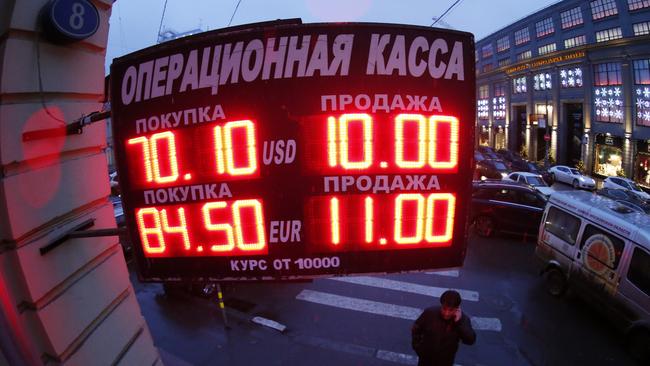Russia sanctions spark jitters, markets brace for rouble collapse
A wild ride in markets continued on Monday as fears around Russia unwound much of the optimism that emerged late last week.

Business
Don't miss out on the headlines from Business. Followed categories will be added to My News.
A wild ride in global financial markets continued on Monday as tough new sanctions on Russia and its subsequent decision to put its nuclear forces on alert unwound much of the optimism that had emerged late last week after initially limited steps to isolate the country over its invasion of Ukraine.
Risk aversion and safe-haven demand dominated after the US and its European allies stepped up pressure on Russia by cutting some of its banks from the SWIFT financial messaging system and banning transactions with its central bank, potentially freezing access to much of its $US643bn ($896bn) in foreign reserves, and leaving the Russian rouble vulnerable to a collapse.
The Russian central bank moved quickly to bolster its position, lifting its key interest rate from 9.5 per cent to 20 per cent.
Investors had been primed for a positive week as the recent correction in US and European equities appeared to bottom out with big gains at the end of last week, after the US said it was not targeting Russian energy transactions and international markets remained open to most of its banks.
But the weekend announcements sparked fear of a collapse in the rouble, which lost as much as 29 per cent of its value against the US dollar when trading resumed on Monday evening (AEDT).
There was also fear that the Russian sanctions would have unintended consequences for the global financial system and economy as global financial markets became decidedly risk averse.
Australia’s S&P/ASX 200 index recovered from an intraday dip to close up 0.7 per cent at 7049 points, although that was about a third of the rise that was expected before the latest sanctions. The resources sector soared on expectations that war in Ukraine and the isolation of Russia would boost the prices of oil, gas, palladium, aluminium, copper, nickel, iron ore, coal and grains.
Brent crude oil prices were up almost 5 per cent at $US102.50 a barrel, spot gold rose 1 per cent to $US1903.73 an ounce and Chicago wheat soared 9 per cent to $US9.34 a bushel.
Oil-dependent Chinese and Japanese sharemarkets were surprisingly little affected by the jump in oil.
But S&P 500 futures fell more than 2 per cent and Euro Stoxx 50 futures fell more than 3 per cent, pointing to a rough night ahead for US and European markets.
But whether the financial and economic risk posed by the war in Ukraine causes the Fed and ECB to “blink” on monetary policy tightening plans next month remains to be seen.
As of Friday, there was no sign that the Fed would baulk. Neither FOMC governor Christopher Waller nor St Louis Fed president James Bullard altered their desire to see 100 basis points of Fed tightening by July. And ahead of chairman Jerome Powell’s testimonies to House and Senate panels on Tuesday and Wednesday, the Fed’s report to congress said “it will soon be appropriate to raise the target range for the federal funds rate,” citing inflation well above target and a “strong” labour market.
But this hawkish rhetoric predates the latest Russia sanctions and fallout.
Credit Suisse strategist Zoltan Pozsar drew comparisons with the September 2008 Lehman Brothers collapse that sparked the Global Financial Crisis and the Covid panic in financial markets of March 2020, warning that “central banks should stand ready to make markets [liquid] on Monday again”.
Veteran investors will also remember the panic caused by the LTCM collapse of August 1998 after Russia defaulted on its debt. A similar scenario is possible now if the West pushes too hard.
RBC’s head of global commodity strategy, Helima Croft, who has worked for both Lehman Brothers and the CIA, said Russian responses to heightened sanctions was “perhaps the greatest uncertainty”.
“Putin could seek to inflict significant pain on western nations in response to last night’s actions and commodity prices may feel the impact of his countermeasures,” she said.
While the EU and Washington avoided the “nuclear option” of a full SWIFT expulsion, Sunday’s decision to disconnect select financial institutions from the international payments system, sanction the Russian central bank and expand the number of officials and oligarchs on the SDN list, would “make it complicated and cumbersome to transact with Russian entities, including those in the energy sector”.
She saw a possibility that Russia’s second-largest bank, VTB, could be removed from SWIFT given that it had already been subject to full blocking sanctions by the US Treasury’s Office of Foreign Assets Control.
VTB holds almost 20 per cent of banking assets in Russia and is the largest player in the country’s commodities trade, so while Russia’s commodities trade could migrate to one of the banks excluded from the SWIFT action, this could take time. The US insists it is not seeking to disrupt energy exports given the tightness in the market, and China was a “prime candidate” to take additional discounted Russian barrels. “Nonetheless, we do think a number of Western firms may decide that it is not worth the risk of continuing to do business with Russia given the uncertainty about enforcement and the trajectory of future coercive action,” Ms Croft said.
And the central bank sanctions – the first for a G20 central bank – “may provoke strong risk aversion” on the part of corporations dealing with Russia.
“In addition, the EU and the US will certainly ratchet up the sanctions pressure as long as Russia proceeds with its military campaign,” Ms Croft said. It may eventually prove untenable for Western nations to continue to publicly exempt energy transactions, if there were high numbers of civilian casualties and Ukraine President Volodymyr Zelensky appealed for such action.





